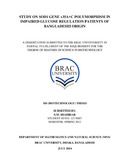Study on SOD1 GENE +35A>C polymorphism in impaired glucose regulation patients of Bangladeshi origin
Abstract
Superoxide dismutase 1 (SOD1), located at the cytosol has been postulated to represent
between 50%-80% of the total SOD activity. The SOD gene is located at 21q22.1.
Polymorphisms in the genes encoding these enzymes found to be significantly affecting its
antioxidant role. As oxidative stress is a common pathogenic factor for the dysfunction of
beta and endothelial cells, polymorphism of SOD genes and oxidative stress has become a
subject of intense scrutiny for their association with different disease conditions including
T2DM. The study was aimed to assess the possible association of SOD1 gene +35A/C
polymorphism in the pathogenesis of IGR subjects of Bangladeshi origin. A total number of
54 middle aged (age range: 30-65year) subjects with Impaired Glucose Regulation (IGR)
were consecutively recruited. Total number of healthy control was 55. IGR was diagnosed
following WHO guideline. Blood glucose was measured by glucose-oxidase and,
triglyceride, total cholesterol and HDL-cholesterol by enzymatic colorimetric method.
Insulin was estimated by enzyme linked immunosorbent assay (ELISA). DNA was
extracted using QIAGEN Blood DNA Kit which utilizes silica gel DNA separation.
SOD1 gene +35A/C variant was determined by PCR-RFLP using restriction endonuclease
HhaI. Data were managed using Statistical Program for Social Science (SPSS). Unpaired
Student's -`t' test and Chi-squared tests, as appropriate, were performed. The number of
study subjects of wild AA genotype in control and IGR group was 52 and 54 respectively
whereas in case of heterozygous (Ht) variant AC genotype the number was 0 and 2
respectively. SOD1 +35A>C genotype frequency analysis has not shown statistical significant
association (χ2 = 2.075 and p= 0.150). For control group, the genotype frequencies of AA and
AC were 1.0 and 0 respectively. For IGR group, the frequencies were 0.963 and 0.037
respectively. The data showed that SOD1 gene +35A>C variant is substantially different from
other population and the polymorphic allele is not associated with insulin secretory defect of
IGR subjects of Bangladeshi origin.

